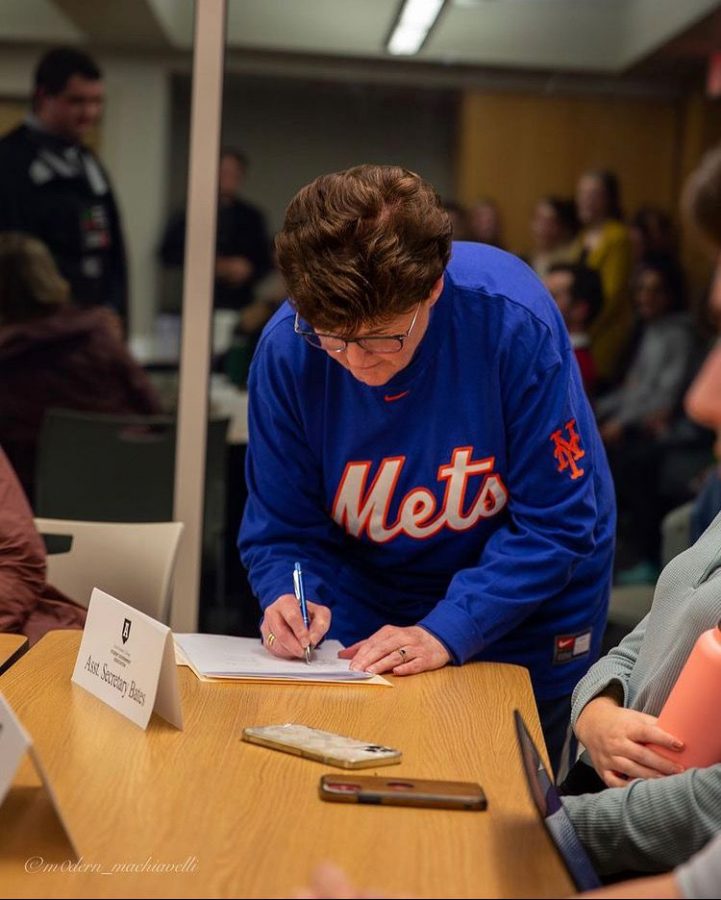‘Hawks for Life’ wins OK from SGA
Students argue for a pro-life club; abortion rights debate intensifies
Dean of Students, Alicia Finn, signing the approval papers for the Hawks for Life Club, October 25th, after SGA unanimously voted for the club.
November 5, 2021
Saint Anselm students may find agreement in Goffstown’s unremarkable nature. However, on the contrary, the swing state of New Hampshire proves to be quite the asset. In consideration of a strong socio-political environment, as well as the Benedictine values of Saint Anselm as a Catholic institution, a controversial debate falls between Pro-Life and Pro-Choice advocates.
In modern-day politics, abortion has persisted as a subject of great contention. In a voter demographic increasingly composed of Millennials and Generation Z, civic engagement has become a norm on college campuses. According to a 2021 Gallup poll on Values and Beliefs, the majority of college-aged students associated themselves with one side or the other; among 131 interviews, 56 percent claimed to be Pro-Choice, 39 percent were Pro-Life, and a mere 5 percent average of Americans ages 18-29 declared no preference altogether on the matter.
For certain students like Rachel Statz, the formal implementation of a Pro-Life club at Saint Anselm has been a long time coming. The junior Theology and American Studies major has been advocating for this organization since 2019, organizing efforts through exhaustive meetings with Campus Ministry, Student Engagement and Leadership (SEAL), the College Dean, and SGA. Last Monday, on October 25, the club was officially approved through the Senate, 363 days after the original club Constitution had been submitted. “It was a very emotional and joyous day, to say the least,” Statz remarked, finally overcoming a year’s worth of delays and frustrations.
In garnering peer support, Statz prioritized electing “vibrant, enthusiastic women” who share her passion for the Pro-Life movement. In Marguerite Ortiz (2025), Kathleen McCarthy (2021), and Renee Suhocki (2022), Statz found “natural leaders to be the club officers. “As President of the club, Hawks for Life, Statz strives to “support the sanctity of all human life from conception until natural death.” She emphasizes that the club will serve as “a resource to everyone at St. A’s, especially women, who find themselves in a vulnerable situation and need help.” During her Freshman year, Statz attended a New Hampshire Right to Life Banquet, an experience she credits to driving her passion and advocacy. Overall, the Pro-Life advocate wishes to create an outlet for other students, “empowering others to uphold and defend life, regardless of religion or political affiliation.”
However, the idea of an official Pro-Life organization on campus seems more daunting than exciting for some students, especially those who fall across the aisle in the abortion debate. Sophomores Isabella Petrosino and Kayla Reardon, both self-identified as Pro-Choice, express “discomfort” with the prospect of a partisan group representing such a diverse student population. Reardon describes her concerns with this club in that “it sounds as though it is named to be representative of the whole student body, but not all of us wish to be represented as Pro-Life.” A general malaise for Pro-Life opponents, in general, is the promotion of religious values over a population who may not universally adhere to these principles. However, as a school-based organization, it is presumed that the club will act as a mere outlet, not an enforcer of partisan viewpoints.
Although this topic has proven to become a controversial manner within the college community, it has prompted further involvement in civic matters. The promotion of a Pro-Life club has ultimately signaled for opposing Pro-Choice advocates to share their alternate opinions as well. The aforementioned Pro-Choice students, in addition to sophomore Kayla Panagrosso, express interest in seeing a school-based Pro-Choice club, with emphasis on advocacy for “women’s healthcare, rights,” and sexual-health education.
The discussion sparked by this polarizing issue highlights an advantage Saint Anselm students have: exposure to a vast array of socio-political values and beliefs. The state of New Hampshire is critical to the democratic process, as it is the first state to hold the primaries in the presidential election. As a result of this regional characteristic, and the school’s very own Institute of Politics, Saint A’s students are inherently more exposed to divisive issues. A 2014 Gallup poll found that, in the state of New Hampshire, a near half-and-half split described partisanship, with 41 percent of Republicans leaning right, and 44 percent of Democrats leaning left. In evaluating political ideology, the same poll reported a 40 percent average of moderate political leanings, reflecting the commonality of bipartisanship.
While the political atmosphere of the college community does not reflect universal agreement, it provides assurance that controversial matters can be met with respectful co-existence rather than hostile partisan polarization. In moving forward past the limitations of COVID-19 restrictions, a sense of determination can be found among students passionate to engage in matters close to them, positively shaping the future of civic engagement.



